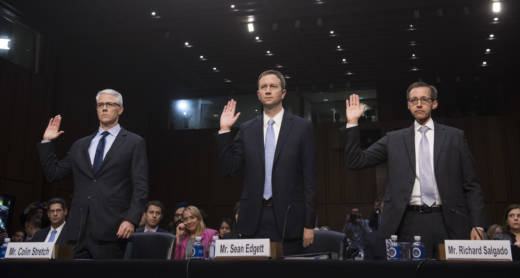Combined, the advertising and social media campaign cost about $200, but created a tangible show of polarization that brought out crowds and received news coverage.
"I'm certain that our adversaries are learning from the Russian activities and even watching us today," Burr told the witnesses. "Simply put, you must do better to protect the American people, and frankly, all of your users from this kind of manipulation."
The lawyers spoke with the Senate Intel Committee Wednesday morning, and with the House Intelligence Committee in the afternoon.
Watch the House Intel Hearing
In a similarly interesting look into the content of the Russian interference efforts, on Wednesday, the House committee released a small sample of the ads Russia was pushing.
The ads take on a number of issues, but mostly focus on polarizing issues within American culture. One refers to Democratic presidential nominee Hillary Clinton as "Killary Clinton" and another says "racism won, ignorance won, sexual assault won" in reference to President Trump's election victory.
Others focused on social issues like LGBT rights and the treatment of Muslims in America. Ranking Democrat Adam Schiff made the point that regardless of who creates the content, foreign adversary or American user, the fact that the social media business model is based on exciting and inflammatory content is inherently a problem.
"These algorithms, which are designed to attract our attention and keep our eyes focused on the platform for advertising purposes, may also have the unintended consequences of widening divisions among our society – polarizing people," Schiff said.
Schiff pushed the companies on whether they had an interest in letting users know if they saw or were the target of Russia-backed content. The companies deflected and pointed to technical difficulties, based on the fact that their numbers are based on modelling and not counting specific instances.
The two hearings Wednesday came after a Tuesday session before a Senate Judiciary subcommittee, and Wednesday's were noticeably more heated. Multiple lawmakers wondered aloud why they were talking to the general counsels for the companies, instead of the CEOs.
"I have more than a little bit of frustration that many of us on this committee have been raising this issue since the beginning of this year and our claims were frankly blown off by the leaderships of your companies," said the ranking Democrat on the committee, Sen. Mark Warner, D-Va. "Candidly, your companies know more about Americans than the United States government does and the idea that you had no idea that any of this was happening strains my credibility."
Watch the Senate Intel Hearing
The Big Tech lawyers said they were sympathetic, but would not completely commit on the record to supporting legislation that would regulate transparency for political ads on their platforms. They did say they agreed that more transparency is needed.
New numbers about the scope of Russian interference were also revealed: about 20 million Americans may have seen content pushed by Russian operatives on Instagram leading up to the 2016 election.
That was according to Facebook General Counsel Colin Stretch, who revealed earlier in the week that an additional 126 million users may have seen the Russia-promoted content on Facebook.
The intelligence committees in both the House and Senate are among the congressional panels investigating Russian interference in the 2016 election cycle and possible ties between the Trump campaign and Russian operatives.
Copyright 2017 NPR. To see more, visit http://www.npr.org/.
9(MDAxOTAwOTE4MDEyMTkxMDAzNjczZDljZA004))

9(MDAxOTAwOTE4MDEyMTkxMDAzNjczZDljZA004))